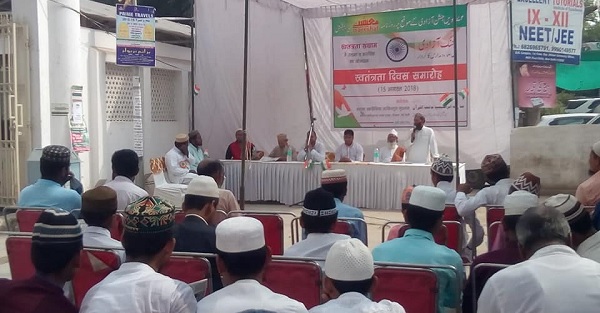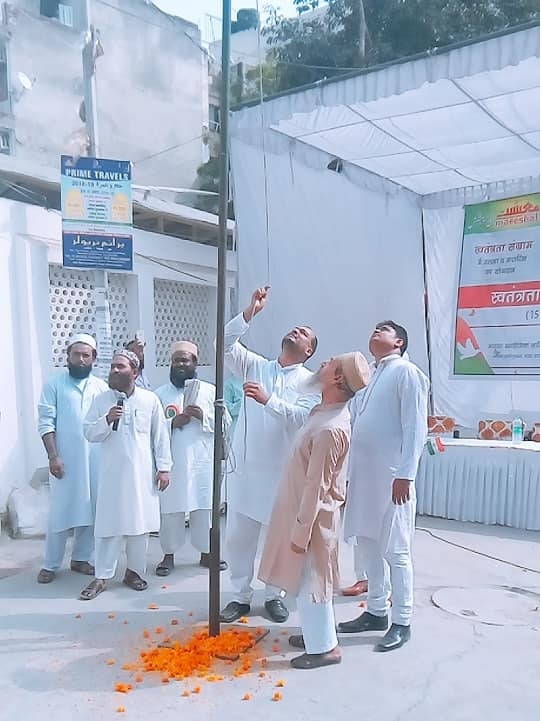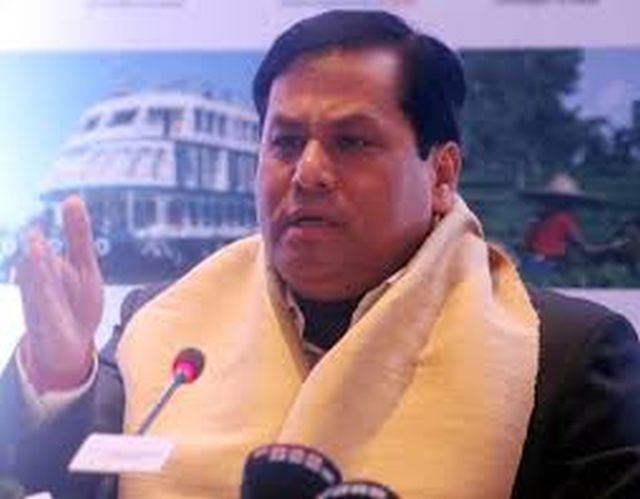
by admin | May 25, 2021 | News, Politics
 By Sidhartha Dutta,
By Sidhartha Dutta,
New Delhi : As Atal Bihari Vajpayee’s funeral procession wound its way through Bahadur Shah Zafar Marg, a man wearing a skull cap and sporting a flowing beard, led a group of madrassa students chanting in praise of the departed leader as a mark of gratitude for the former Prime Minister who once helped him settle a dispute over a mosque.
The students from a nearby Muslim seminary said they had been waiting near a busy crossing close to ITO since early morning on a sultry Friday.
“These children got ready in the morning. They have been waiting since then to get a glimpse of Vajpayee-ji. They said when his funeral procession will pass through the road, they would salute him. He was a man of truth. And such men live forever,” Ameen-ud-Din told IANS.
Ameen-ud-Din is a member of the management of Madrassa Rasheedia, run by Masjid Bhoori Bhatiyari at Bahadur Shah Marg in central Delhi.
“For a man who stood behind each one of us, we have only this to say that ‘Jab tak sooraj chaand rahega….Atalji ka naam rahega‘.”
Ameen-ud-Din said he had always remembered Vajpayee as a leader “who took people of every religion along, a genuine human being”.
“We respect him for that. We would want to thank him from the bottom of our hearts.”
Ameen-ud-Din then narrated a story of how he had personally see Vajpayee’s large-heartedness and inclusiveness when he was the Prime Minister.
“He called us to his residence on the issue of a mosque. He treated us with respect. Our Hindu brothers were also present (in the meeting).
“He called up the Home Minister (L.K. Advani) and informed him about the matter. He also assured us that the mosque which was shut would be re-opened.
“‘You don’t worry. This is Hindustan’,” Ameen-ud-Din, recalled Vajpayee’s words of reassurance to him.
He said he had shared the anecdote with the children of the madrassa and when the news of Vajpayee’s death broke, they felt very sad.
They said such a mass leader who had such an immense respect for every religion is rare and wanted to pay their gratitude to him — posthumously though.
Vajpayee, who passed away at AIIMS on Thursday evening, had a pan-India appeal and is remembered for his six-year rule as the head of the right-wing BJP government.
The country observed a seven-day state mourning as a mark of respect for the leader was decorated with Bharat Ratna and was very popular. The tricolour is flying half-staff.
—IANS

by admin | May 25, 2021 | Entrepreneurship, News, Social Entrepreneur

Danish Reyaz began getting students of Madarsa Ibrahimia Taleem ul Quran at Delhi’s Batla House.
By Maeeshat news,
New Delhi: In Delhi’s Batla House, the 72nd Independence Day celebration didn’t lack the grandeur and zeal.
Scores of Madrasah students gathered at the Khalilullah Masjid and marked the occasion with patriotic songs on Wednesday.
“The main objective of organising this event is to eliminate the negative impression among people that students studying at Madrasahs don’t love their nation,” said Danish Reyaz, organiser of the event and managing direct of Maeeshat Private Limited.
At the entrance of the Khalilullah masjid, the imam of the mosque and along with Madrasah students hoisted the national flag.

“Madrasah students should not be deprived of modern studies,” pointed Reyaz.
The celebration was attended the residents as well as Ulemas.
Children and elderly persons also participated in the Independence Day celebration this year.
Attractions of Independence Day Celebration
The main attraction was singing of National Anthem by Maadrasah students and National Flag hoisting ceremony.
Why Batla House made headlines earlier?
Batla House is the place where the two alleged terrorists were shot dead in a mid-morning encounter by the police in 2008.
Delhi Police said five suspected terrorists, holed up inside House No L-18, Batala House in Jamia Nagar, near Khalilullah mosque, exchanged heavy fire with the police team that tried to enter the house for investigations.
Inspector Mohan Chand Sharma, 41-year-old highly decorated Inspector, was hit by three bullets — in his abdomen during the encounter. He was taken to the nearby Holy Family Hospital, where he later succumbed to his injuries.
Batla House encounter in a nut shell
In September 2008, nearly 30 people were killed in a series of bomb blasts in the national capital. Acting on a tip off, Delhi raided the terrorists’ hide-out Batla House.

by admin | May 25, 2021 | Opinions
 By Admiral Arun Prakash (Retd),
By Admiral Arun Prakash (Retd),
Independent India and I are both septuagenarians, but since I am a trifle older, I take the liberty of indulging in some reminiscences on the nation’s 71st birthday. My recollections are focused on Kashmir where I was born, in a town called Anantnag.
I particularly remember the traumatic night of October 30, 1947 when India was 10 weeks old and I had just turned three. In my mother’s arms I, with two elder siblings, hid under bushes in our garden as bullets ricocheted off our cottage roof. We lived in Badgam village, 30 km from Srinagar airport. The fusillade was coming from surrounding hills, occupied by Pakistani kabailis (tribals), en route from Uri and Baramulla, hoping to capture Srinagar airport.
At dawn, we piled into the family horse-drawn tonga, with just the clothes on our back and fled to the airport, where RIAF DC-3 Dakotas were disembarking Indian troops. We clambered into a departing aircraft, which flew us to Delhi, and refuge, with relatives.
Growing up in lovely little towns of the Valley in post-independence decades was idyllic and I reluctantly parted from my parents in Leh in 1959, to join college and the Indian Navy. In Jammu and Kashmir, my playmates were all Kashmiris — of Muslim, Hindu and Sikh faith. Our parents were friends; we ate in each others’ homes and celebrated festivals together. But even as children, we understood that Kashmir was not (yet) India, and that the average Kashmiri’s attitude towards India was ambivalent.
India provided huge financial assistance to Jammu and Kashmir: Food, education, clothing and medicine were either free or heavily subsidised. Kashmiris would accept the largesse, but tune in every evening to Radio Pakistan which invariably played on their religious heart-strings, spouting propaganda about “occupation” of Kashmir and “atrocities” by the Bharatiya fauj (Indian Army).
Kashmir’s first ‘Prime Minister’ (he was called Wazir-e-Azam) Sheikh Abdullah was the state’s tallest figure then; a friend of Nehru’s and a staunch secularist, he was the self-styled Sher-e-Kashmir (Lion of Kashmir). In 1953 we were startled to hear that he had allegedly conspired with the Americans to become “King Abdullah” of an independent Kashmir. He was arrested and the Valley burst into flames.
I recall seeing my father, then Magistrate of Baramulla, coming home, bleeding from the head; there had been stone-pelting in the old town, as agitators waved Pakistani flags and shouted pro-Pakistan slogans.
While the 1950s and 60s may not have witnessed wild enthusiasm for India, there was neither hostility nor bitterness amongst Kashmiris.
However, an utterly unimaginative New Delhi had little to offer them, apart from money. As much as 95 per cent of the millions that India poured into Jammu and Kashmir never reached the impoverished Kashmiri. In the absence of a politico-economic strategy for creating jobs, industry or infrastructure, Indian money merely enriched Kashmiri politicians and aggravated popular resentment and alienation, which Pakistan exploited.
India’s maladroitness did not end here. A succession of Pakistani-orchestrated incidents, between 1963 and 1999, demonstrated the ineptness of our intelligence agencies, lack of civil-military coordination and the complete strategic bankruptcy of New Delhi. This depressing sequence included the theft of Prophet Mohammad’s sacred relic, seizure of Hazaratbal shrine, capture and burning of the Charar-e-Sharif shrine, expulsion of Kashmiri Pandits from the Valley, the Kargil War and hijacking of IC-814.
This reminiscence is not a history of Kashmir’s travails, but merely a reminder to those who profess shock at recent developments in the Valley that the Indian state has, since 1947, learnt nothing from history, repeated its mistakes and failed to convince Kashmiris that they are Indian.
The French have a cynical aphorism: “the more things change, the more they remain the same”. This Independence Day, let us introspect if this is true of India’s management of Kashmir.
(The author is a former chief of the Indian Navy and Chairman, Joint Chiefs of Staff. The article is in special arrangement with South Asia Monitor.)
—IANS

by admin | May 25, 2021 | News, Politics
 New Delhi : Delhi Chief Minister Arvind Kejriwal on Wednesday reminded people on the occasion of Independence Day that no religion teaches animosity.
New Delhi : Delhi Chief Minister Arvind Kejriwal on Wednesday reminded people on the occasion of Independence Day that no religion teaches animosity.
As he and his deputy greeted the people on the occasion, Manish Sisodia told them to aspire for freedom from the shackles of caste, religion and narrow outlook.
Sharing a couplet from Urdu poet Muhammad Iqbal’s patriotic song “Sare Jahan Se Accha”, Kejriwal wished that there be all around development in the country and peace should prevail.
“Religion does not teach us animosity… We are of Hind, our homeland is Hindustan,” he tweeted.
Sisodia said only political freedom does not make a country free.
“Let’s remind ourselves on the occasion that a free country is not made up of only political freedom. Freedom from the struggles over caste and religion, and narrow outlook towards women ensures that a country is truly free,” he said.
—IANS

by admin | May 25, 2021 | News, Politics

Sarbananda Sonowal
Guwahati : Assam Chief Minister Sarbananda Sonowal on Wednesday reiterated his commitment to making the state free of corruption, terrorism and illegal immigrants.
He made the remarks after he unfurled the national flag marking the nation’s 72nd Independence Day at the Veterinary College ground in Khanapara here.
Sonowal assured that his government was keeping a close watch to ensure that no genuine Indian citizen’s name was left out of the final draft of the National Register of Citizens (NRC) and equally alert that no illegal foreigner’s name entered the list.
The Chief Minister thanked the 55,000 government employees who made the NRC upgradation a reality and the Assam Police for being able to maintain law and order in the state.
“We firmly believe that the NRC is going to make Assam free of illegal foreigners,” said Sonowal, adding that his government has taken stern steps to seal the Indo-Bangladesh border effectively to ensure that there is no fresh infiltration from across the border.
Regarding the multi-crore cash-for-jobs scam, the Chief Minister said: “A total of 55 people have been arrested so far and the recruitment process has been made transparent.”
Sonowal also said the government has taken up steps to empower women, particularly in tea garden areas.
Thousands of people in Guwahati and across the state took to the streets to celebrate Independence day despite a boycott call give by militant outfits.
—IANS






